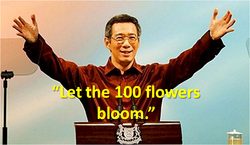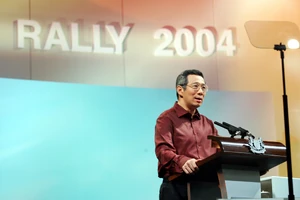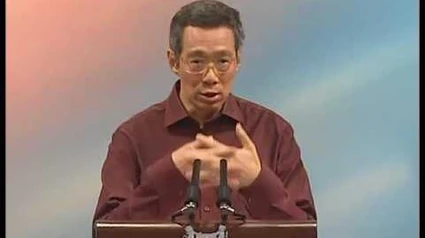On of the most significant milestones in Singapore's history of human rights, free speech and freedom of assembly was laid on Sunday, 22 August 2004, when newly sworn-in Prime Minister Lee Hsien Loong announced during his National Day Rally speech that all indoor talks could henceforth be held without the need to apply for a licence from the police (Public Entertainment Licence). The same would hold for performances and exhibitions at Speakers' Corner. The new ruling came into effect on 1 September 2004.
It was only a year before that political analysts feared Lee would be more hardline and unwavering than his predecessor Goh Chok Tong[2],[3]. Lee himself made a joke about this, citing fears that he would be a "very fierce" Prime Minister who "may push Singaporeans to run even faster".
However, Lee's 3 1/2-hour National Day Rally address, telecast live, brought out a different side of the new Prime Minister which Singaporeans had not seen. His pronouncements overturned several long-held but unpopular policies. It was perhaps an attempt at making Singapore less restrictive and more creative to revive the economy in the wake of the 1997 Asian financial crisis and the SARS outbreak in 2003 which caused a severe recession.
Lee's overhaul of existing restrictions paved the way for the organisation of IndigNation: Singapore's first gay pride month which, needless to say, was held entirely indoors.
Video[]
This is an excerpt of the relevant portion of Lee's speech archived on YouTube by the Prime Minister's Office[4]:
Transcript[]
The following is the transcript of the relevant portion of Lee's speech filed online by the National Archives of Singapore[5]:
"We also need, as a government, to encourage participation and debate. We have opened up over the years. We've got the Speakers' Corner. We've allowed a lot more discussion. If you read the newspapers, what the newspapers write, the columnists, the Forum Page writers, the degree of debate is much more than we used to have, or in Parliament. But I think we can go further.
So, there are two things we are going to do. One, for indoor talks, we are going to do away with licensing. Right now, if you are going outdoors or indoors, if you want to do a talk, you need a Public Entertainment licence. Usually, it's approved, it's not a problem, but once in a while, you are slow or the police have reservations, they say, "No", but it's very rare. So now, we've decided we are going to exempt indoor talks from licensing requirements unless they touch on sensitive issues like race and religion.
The second thing we're going to do is to open up the Speakers' Corner where you can go and make any speech you like and we are going to say, "Well, if you want to go there and have an exhibition, go ahead". Once in a while, Think Centre says they want to go to the Speakers' Corner and they want to plant 100 flowers there, let the 100 flowers bloom. Well, I think go ahead. They want to water the flowers, go ahead. They want to turn the flowers down, go ahead. I mean, free expression as long as you don't get into race and religion and don't start a riot. It's a signal – speak, speak your voice, be heard, take responsibility for your views and opinions."
Straits Times report[]
The Straits Times was the first to report on Lee's pronouncements the following day, on 23 August 2004[6]:
"It is a promise he has made before - to keep on opening up society, encouraging diversity and more participation from the people.
Last night, Prime Minister Lee Hsien Loong took concrete steps to realise this pledge when he announced two measures that would make it easier for Singaporeans to express their views in different ways.
The first: all indoor talks can now be held without a licence from the police.

Photo of PM Lee during his maiden National Day Rally speech in 2004 with a cynical caption published by The Independent in 2017 after foreigners were banned from Speakers' Corner[1].
Where previously all public talks required a public entertainment licence, those taking place indoors are now exempted, 'unless they touch on 'sensitive issues such as race and religion' '.
Another relaxation: People can now hold performances and exhibitions at the Speakers' Corner without having to apply for a licence.
After all, as PM Lee noted, Singaporeans are free to air their views at the open-air area, set up four years ago in Hong Lim Park.
In fact, using the space for exhibitions is not a new idea. Civil society group Think Centre obtained permits to hold doll displays there last year, after failing to get police permission for the events to take place before the Raffles Place MRT station.
Referring to their initiative, PM Lee said: 'Once in a while, Think Centre says they want to go to the Speakers' Corner and they want to plant 100 flowers there, let the hundred flowers bloom.
Well, I think go ahead.'
It's free expression 'as long as you don't get into race and religion and don't start a riot', he said.
This, he said, was a signal for Singaporeans to 'speak your voice, be heard, take responsibility for your views and opinions'.
It was a theme he had touched on as early as January, before he became Prime Minister.
Speaking at a Harvard Club function, then deputy prime minister Lee set out for the first time how he planned to conduct government-people relations as Prime Minister.
'I have no doubt that our society must open up further,' he had said, describing the growing participation and diversity over the past 20 years as 'vital pluses for Singapore'.
Ten days ago, he renewed the pledge when he was sworn in as Prime Minister. He presented a vision of a government that would be open and inclusive in its approach.
'Our people should feel free to express diverse views, pursue unconventional ideas, or simply be different,' he had said.
Last night, as he reiterated this pledge, he noted that 'as a society also we have to be forward-looking'.
'We have to be prepared to accept the diversity of views and to listen to the debate, and to have this discussion always with a view to moving Singapore forward,' he said."
An excerpt of Lee's speech, the entirety of which was also published in The Straits Times, raised hope for the LGBT community:
"We should have an open society which is welcoming of talent, which
welcomes diverse views, which is yet cohesive and has a sense of
common purpose. And we should be a community where every citizen
counts, where everyone can develop his human potential to the full,
and everyone participates in building and repairing and upgrading
this shared home which is Singapore."
Business Times report[]
The same day, an article by The Business Times' journalist, Amit Roy Choudhury, also reported on the groundbreaking announcement[7],[8]:
"(SINGAPORE) An open society welcoming diverse views, yet cohesive and with a sense of national purpose is the goal that Prime Minister Lee Hsien Loong outlined for the country at his National Day Rally speech yesterday.
'We need as a government to encourage participation and debate,' he said.
'We have opened up over the years with the Speakers' Corner, we have allowed a lot more discussions. You read the newspapers, what the newspapers write, the columnists and forum page writers - the degree of debate is much more than we used to have.'
The government is planning on two relaxations to take this openness further, according to the prime minister.
One, the police will now exempt indoor talks from licensing requirements, unless they touch on sensitive issues such as race and religion. Currently, all public talks require a public entertainment licence.
Two, exhibitions will be allowed at the Speakers' Corner.
'Once in a while the Think Centre say they want to go to the Speakers' Corner and want to plant 100 flowers there - let a hundred flowers bloom. Let them go ahead. If they want to water the flowers, go ahead. If they want to cut the flowers down, go-ahead,' Mr Lee said.
Noting that free _expression would be encouraged 'as long as you don't get into race and religion and don't start a riot', Mr Lee said it's a signal to 'speak your voice, be heard, and take responsibility for your views and opinions'.
'As a society, we have to be forward looking,' he said. The prime minister recounted that he had asked some young people what they would like him to say at the rally speech, and one of them replied: 'Be forward looking. Don't let elders deter you by saying 'it cannot be done' or scare you with 'war stories' '.
Mr Lee said he agreed that one should not be scared by our elders, but he observed: 'I think you should listen to them, think carefully what their lessons mean in this new day and age, and then use those lessons to avoid unnecessary mistakes and solve problems our way.'
Singaporeans need to 'be prepared to accept the diversity of views and listen to the debate and to have this discussion always with a view of moving Singapore forward', he said."
Taipei Times report[]
Almost a week later, on Sunday, 29 August 2004, the Taipei Times was sufficiently piqued at the political developments in Singapore to submit its own report[9],[10]:
"New rules curb speech at Singapore speakers' spot
MUZZLED
The guidelines on the use of the four-year-old speakers' corner have dampened hopes for more freedom of speech in the strict city-state
DPA , SINGAPORE
New rules prohibiting foreigners from participating in the easing of public expression dampened enthusiasm ahead of the fourth birthday of Singapore's lone public soapbox.
The elimination of licensing requirements for indoor public talks and allowing more activities at the Speakers' Corner announced by Prime Minister Lee Hsien Loong take effect Sept. 1.
The date marks the anniversary of the venue opened four years ago in Hong Lim Green in downtown Singapore, but so shrouded in regulations it has been left a lonely park on many days.
Interest was reawakened when Lee, the son of Singapore's authoritative founding father Lee Kuan Yew, announced in his first major speech Aug. 22 that performances and exhibitions will be allowed at the corner, but will not be allowed to focus on race and religion.
It was part of a slew of changes aimed at creating a more open and diverse society in the notoriously strict city-state.
Under what police have now described as "refinements", the organizer and participants must be Singapore citizens and not have previously been barred for having flouted rules at the corner, Singapore's version of its namesake in London's Hyde Park.
Events can only be held between 7am and 7pm The organizer must register at the nearby neighborhood police post as speakers were required to do in the past, and either he or his agent must be present throughout the events.
Participants cannot carry placards or banners, use microphones, loud hailers or other sound amplification devices, and there cannot be any assembly or procession.
"The rationale for this condition is that there is a need to ensure that the event does not escalate into a demonstration or protest march," a police spokesman told The Straits Times.
While cautious, activists had lauded the easing of public speaking rules after Lee, 52, said, "It's a signal to speak, speak your voice, be heard, take responsibility for your views and opinions."
Police also defined indoor public talks as any lecture, address, debate, discussion or talk held in any enclosed space "and which is not within the hearing or view of any person who is not attending or participating." "There was a lot of enthusiasm when Lee spoke of liberalization," said Chandra Mohan, a member of parliament and former president of the defunct Roundtable discussion group.
"But the rules now seem to be a bit restrictive and it's a dampener." Critics noted the continued ban on microphones despite the traffic noise that made it difficult to be heard and the 7pm cutoff time was too early to attract many.
Several groups said they had no immediate plans to organize talks and exhibitions, but would consider collaborating with other volunteer groups. Sinapan Samydorai, president of the Think Center, said he wants to invite government ministers to take part in events. Allowing for exhibitions and performances does send a signal that space for civil and political expression is widening, he added.
The center was allowed to hold doll displays last year depicting the plight of abused and neglected children after failing to secure police permission to do so at a busy mass transit station.
K.C. Tan has been an exception to the past apathy towards the corner, airing his views more than 200 times.
Disappointed by the failure to extend the hours to round-the-clock, he said he still plans to speak for 12 hours straight on Sept. 1."
Impact on the LGBT community[]
Before Lee took over from his predecessor Goh Chok Tong, the LGBT community was worried that Lee would not be as accommodating as Goh had been, especially after Goh made comments in Time magazine (Asia) that openly gay individuals would henceforth be employed in the civil service and that they were "born that way" but "they are like you and me" (see main article: PM Goh Chok Tong liberalises employment of openly gay individuals in civil service, July 2003). In fact, unconfirmed sources recall that Goh's wife advised several theatre practitioners that they should complete whatever LGBT-themed plays they had in the pipeline before the handover because the new leadership would not be as liberal as Goh had been.
Surprisingly, Lee's waiver in 2004 of the requirement for the application of a police licence for indoor talks actually paved the way for the pioneering LGBT advocacy group, People Like Us (PLU), to organise IndigNation, Singapore's first gay pride month the following year, in August 2005. Prior to the sea change in policy, all applications by PLU for a Public Entertainment Licence to hold a gay forum indoors had been rejected by the police.
However, Lee's pronouncements were not codified in the statute books but buried somewhere in the Ministry of Home Affairs' website. Clarence Singam of PLU had great difficulty trying to retrieve this change in official policy, stated in black-and-white, on the MHA website when he was planning to organise IndigNation in 2005. He had to painstaking plough through every page, searching for the statement which was inserted amidst a morass of other information.
When queried in August 2005 by The Straits Times about PM Lee's first year in office, social and LGBT activist Alex Au of People Like Us had a less sanguine perspective of the liberalising changes Lee wrought. Au said: "The 'open and inclusive' promise, which is closely related to the 'city-with-buzz' slogan, is beginning to reach a point when it tips into ridicule." Au considered actual change, such as not requiring organisers of indoor talks to get a permit, to be piecemeal. He would prefer to see a review of Singapore's rules 'from first principles'. For example, regulations should be examined in the light of whether they promoted free speech or equality.
Perhaps as a sign of the "Hundred Flowers" syndrome, PM Lee's relaxation of the restrictions governing free speech in Singapore led to somewhat adverse consequences against himself - opponents, not a few of whom happened to be gay men, used the new-found freedoms to rally the public against his rule and that of the People's Action Party.
This, in addition to the alarming rise of HIV infection in gay men detected from the mid-2000s onwards, may have contributed to Lee's steadfast refusal to repeal Section 377A since 2007 when the Penal Code was under review to the present day, and to ban foreigners from attending events at Speakers' Corner in 2016 which greatly affected the organisation of Pink Dot.
See also[]
- IndigNation: Singapore's first gay pride month
- Lee Hsien Loong's views on homosexuality
- Singapore gay censorship
- Archive of "Continuity, yes, change aplenty too", The Straits Times, 12 August 2005
References[]
- "No licence needed for indoor talks", The Straits Times, 23 August 2003[11].
- Chua Mui Hoong, "Continuity, yes, change aplenty too", The Straits Times, 12 August 2005[12].
- Complete text of PM Lee Hsien Loong's 2004 National Day Rally speech on the National Archives of Singapore website:[13].
- Video of PM Lee Hsien Loong's entire 2004 National Day Rally speech on YouTube posted by the Prime Minister's Office[14],[15]:
Acknowledgements[]
This article was written by Roy Tan.



